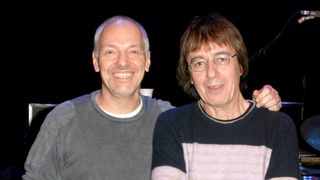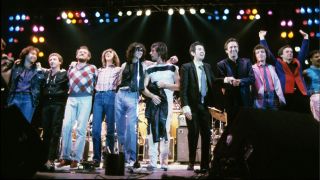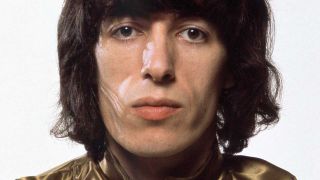Classic Rock met with Bill Wyman – rock royalty, Rhythm King, and for 30 years the bassist in The Greatest Rock’n’Roll Band In The World – at Sticky Fingers, his American-styled bistro in Kensington.
The walls are decked out in glorious Rolling Stones memorabilia, including the fretless bass Wyman invented in 1961 and his old mate Brian Jones’s gold Gibson guitar. “It’s the only thing I’ve got of Brian’s and it’s worth an awful lot of money,” he says wistfully. “It’s my little treasure.”

Jimi Hendrix
I first saw him at a club in Queens in New York in 1966, when he was known as Jimmy James. He did things the average person wasn’t doing, though I knew they’d been done before – playing guitar round the back of your head and biting strings. Jimi was a nice guy and all the Stones got on very well with him.
When we got back from America, I bumped into The Animals at the Scotch Of St James. Chas [Chandler, bassist] said to me: “We’re off to the States next week.” I said: “If you’re in New York, go and see this guy called Hendrix. He’s fantastic.”
So they went, Chas met him and then signed him and brought him over. I was one of the first people to see him here, when he played a club in Bromley [The Bromel Club, in 1967]. It might have been the first gig he did. There was hardly anyone else there. But he still poured lighter fuel on his guitar and set fire to it that night.
Peter Frampton
He was in the Rhythm Kings for the first year. Pete and I go back to when he was about 14 and used to come round to my house. He had this little band at that time. I’m like his mentor, his confidante. I helped get him into the studio for the first time. Whenever he has any decisions to make, he always calls and asks for advice. When he got invited to join Ringo’s band he phoned to say: “Do you think it’s a good move? “He was always highly talented and could do all these great improvised solos.
Pete blew me away, actually. After I joined the Stones in December ’62, drummer Tony Chapman – who’d been in my first band, The Cliftons – got fired a month later. Tony then bought my old equipment and formed The Preachers. And when their guitar player was killed in a car crash in ’64 he was replaced by Peter Frampton. So you can trace him back to my original band.

Brian Jones
Whenever the Stones would go on tour, me and Brian would always share a room. He could be really sweet and lovely and was more intelligent than any of the others. He was very articulate. But he could also be a little bastard sometimes.
He had an evil streak which a lot of people only remember him for. Brian would do nasty things, like steal my girl or something one night. So he’d do the dirty, then you’d end up forgiving him because he’d have that little innocent, angelic smile: “Sorry, man. I didn’t mean it.” So you’d love him and hate him.
I’ve always said good things about him because he was the creator of The Rolling Stones. I don’t care what you say about Mick and Keith, if it hadn’t have been for Brian they probably would have had a different band in Dartford, out in the sticks where they lived. They weren’t Londoners, though Mick always tries on his cockney accent, which he doesn’t deserve, really. The only working-class ones in the Stones were me and Charlie.
The Yardbirds
In the last month or two that the Stones were playing the Station Hotel in Richmond we kept getting these young kids coming up to us. They’d ask us things like: “What key do you play that Jimmy Reed song in?” or “How does the middle section of that Slim Harpo song go?” I had one guy who kept questioning me as to where I got my strings from, and it was [Yardbirds bassist] Paul Samwell-Smith. And the rest of the guys turned out to be Yardbirds, too.
They were learning from us the rudiments of blues riffs. And when we left they took over the venue, but though they never got the same audiences or adulation that we did. But then Eric [Clapton] joined and it became a different kind of band. I’ve been mates with Eric ever since that time. Jimmy Page was the same. He used to come and watch the Stones play in those little venues in ’63 when he was just a session guitarist.
Paul Rodgers
The Rhythm Kings were invited to play on the same bill as Led Zeppelin at the Ahmet Ertegun tribute show [December 2007]. At the aftershow party we did six songs each – with Solomon Burke, Ben E King, Percy Sledge, Sam Moore – over two hours for 3,000 people, with my band supporting them. And all those artists bloody loved the Rhythm Kings.
When we played with Paul Rodgers at rehearsal, he said: “I want this band!” I said: “Piss off, Paul. You’re not having mine, get your own bloody band!” Eric Clapton, Mark Knopfler and Peter Green play with us too. The last time we played with Knopfler at the Royal Albert Hall, he turned to the audience and said: “This band know my music better than I do.” It’s wonderful.

Keith Moon
I used to stay at Moonie’s house a lot. Keith was a wonderful guy but, God he did overindulge. The doctor would come round and give him so much bloody stuff, then three days later Keith would’ve taken it all. There’d be Valium 10s, sleeping pills, wake-up pills and speeding pills, and he would just down them all the time. And there’d be champagne in the mornings, with brandy. I used to watch him in disbelief.
Once I was making a cup of tea in the morning and his lovely Swedish girlfriend [Annette Walter-Lax] came down – I’d heard them fighting upstairs – and she had scratches down each side of her face, with blood. I said: “Annette, what happened?” And she went: “Oh, nothing. Keith just threw the cat at me.”
He’d do the maddest things. If he’d be meeting me and Ringo at Tramp, he’d arrive in a full hunting uniform. He’d have been out and hired fox-hunting gear: hat, coat, riding crop, jodhpurs. One time he bought a cemetery in the West Country as a birthday present for [Who bassist] John Entwistle.
Jeff Beck
Even though Jeff grew up with the blues, his bands have all been quite abstract and a little jazzy. I mean, what he said when he auditioned for the Stones [in 1975] was exactly what I’d told them myself in 1963: “You can’t play slow, 12-bar blues all bloody night.” Jeff was just one of the guitarists the Stones auditioned when Mick Taylor left.
There was Rory Gallagher, Wayne Perkins and Harvey Mandel, the guy from Canned Heat. They all sort of came around and played for a couple of evenings. Jeff was good, but Harvey Mandel had too many effects, echoes and foot pedals. Keith ended up saying: “Bollocks to all that, just play the fucking thing!” We weren’t a gimmicks band. We were just messing with people to see how they fitted, really. And no one quite did. Then we ended up with Ronnie Wood.
The Rolling Stones
Keith still sends me scented candles at Christmas. We all send each other birthday and Christmas presents. It’s still a family thing, social not business, and it works really well. It’s like distant relatives – you’ve got an Auntie Elsie and an Uncle Fred who are really charming but you don’t want to see them all the time.
When I first left the Stones it took a few months to rebuild that relationship with them. It was quite stressful and they didn’t want me to leave. So they became bitchy. Instead of being nice and saying: “Great 30 years. Cheers mate,” Mick would say the most absurd, stupid things, with that spoilt attitude he had. He’d say things like: “Oh well, if anybody has to play bass I’ll do it. It can’t be that hard.”
And Keith said: “No one leaves this band unless they’re in a wooden box.” Anyway, they left the door open for me for two years. Charlie and Mick would phone and say: “You’re not really leaving are you? Have you re-thought it?” Then when it came time for them to do the ’94/’95 tour they had to make a final decision. Mick and Charlie came over and spent the evening with me, trying to talk me into staying. Have I had any regrets about not going back? None whatsoever.
Ringo Starr
I used to see John Lennon quite a bit in America, when we’d sit down and have a nice chat. I remember once, when we were out in Los Angeles, he said to me: “I’d love to go on tour with you and Charlie as a rhythm section one day.” But of course it never happened.
I used to hang out with Paul quite a lot too. I actually gave them a lot of Beatles memorabilia that they never had, like films of them playing Shea Stadium and one of them playing Washington [February 1964], which was the first show they ever did in America. Then I gave Ringo a load of Tony Hancock stuff.
Out of all of them, I was closest to Ringo. I saw him a lot in the 70s when he lived in Monte Carlo and I lived in the South of France. We’d go to clubs, get drunk, go into Monte Carlo, have dinners. Then he’d come around to my house and watch music videos. They were good times. I still see him occasionally.
George Harrison
George played on one of the Rhythm Kings albums just before he died [2001’s Double Bill]. I phoned him up and said: “Can you do a guitar part on this track?” He went: “What are you calling me up for? You’ve got two of the best guitarists in the world in your band – Albert Lee and Martin Taylor. What do you want me for? I only play one note.” And I said to him: “George, that’s the note I want.” So he said: “Alright then. Send me the tape.” Which I did. And his guitar part was great.
Afterwards he wrote me a lovely letter, after I’d sent him a present of the [artist] Marc Chagall book I did [Chagall’s World, with photographs by Wyman], thanking me for asking him to do it. He signed it ‘Bert Weedon’.


